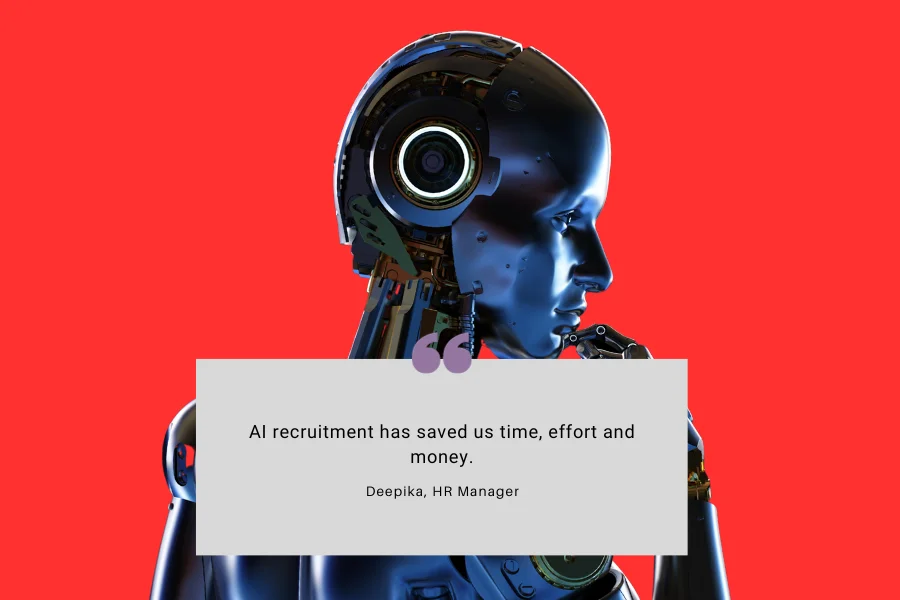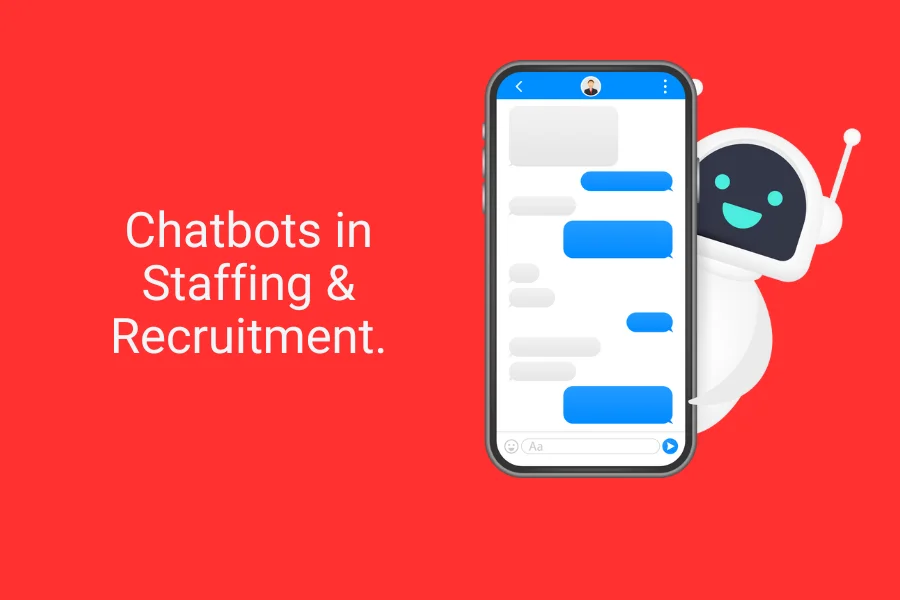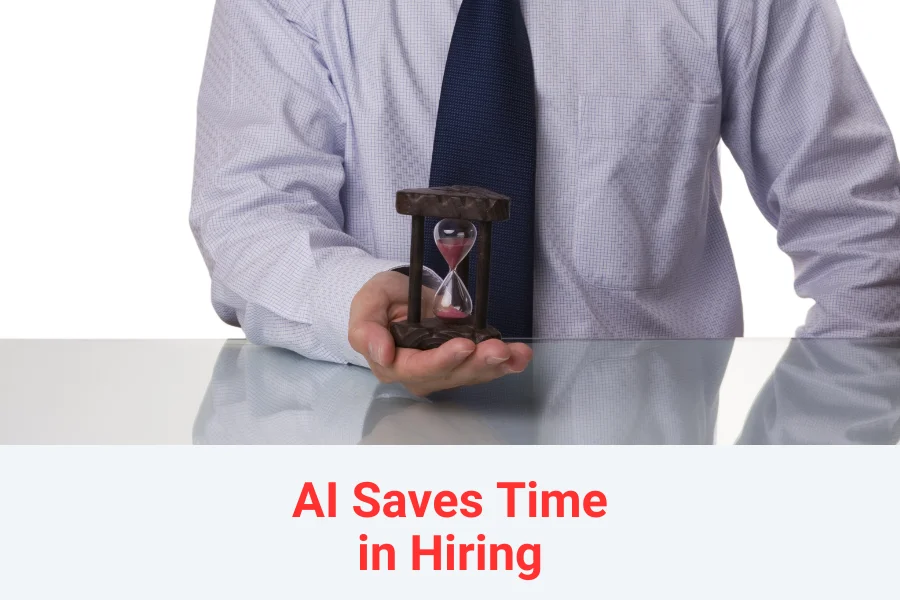Artificial intelligence in staffing not only speeds up hiring, but makes it more precise.
Artificial intelligence in recruitment is a substantial help. In recent times, this technology has returned to the news after great advances have been made. Its full impact is yet to be known, but it is possible to analyze what has already been achieved. After all, HR teams have numerous tools with built-in AI.
Thanks to its capabilities, the processes carried out by recruiters have been streamlined like never before. Today it is very simple and does not consume much time to sift through hundreds of resumes. But progress has also been made in other aspects, such as personalized attention to the candidate.
Due to the importance of AI in recruiting, it is important to understand what exactly it is, the improvements it has introduced and some challenges that will have to be overcome in the present.
Table of Contents
What does artificial intelligence do in staffing?
The main role of artificial intelligence in staffing is to automate tedious and repetitive tasks. At the same time, it collects useful data about the entire process and increases the capacity for its processing and subsequent analysis. In essence, it is a technology aimed at optimizing more routine processes that, despite not being of great value, must be undertaken with quality results, similar to those that a trained professional would achieve.
Artificial intelligence for recruitment is capable of carrying out a wide variety of tasks throughout the entire process. It supplies candidates by publishing job offers automatically, filters resumes according to different variables, assigns appointments to carry out personnel selection tests or interviews and maintains contact with applicants.
AI action at every step of the process frees recruiters to focus on other key tasks, but without losing precision.
However, when supported by an AI, they filter faster and reach the right profile in less time. All thanks to the possibility of establishing filters or performing advanced searches.
How does artificial intelligence improve staffing?
Artificial intelligence in recruiting comes into play in different parts of the process. Their contribution extends the capabilities of human beings to speed up their work and even find aspects of a candidate that would otherwise go unnoticed.
Here are few points on how AI can help in staffing:
- Automated matching of candidates to job requirements: AI can analyze candidate resumes/profiles and job descriptions to automatically find the best matches, saving recruiters time on manual screening. This allows focusing on the most qualified candidates.
- Chatbots for initial candidate screening: AI-powered chatbots can have basic conversational interactions with candidates to gather information and screen for basic qualifications before passing promising candidates to human recruiters.
- Reduced bias in hiring: AI can help remove unconscious human biases from the hiring process by focusing decision-making on skills, experience and other job-related criteria.
- Predictive analytics: AI tools can analyze past hiring data to predict which candidates are most likely to be a good fit or have a high chance of success for a given role. This allows focusing efforts on engaging the most promising candidates.
- Automated scheduling and calendar management: AI assistants can help recruiters efficiently coordinate interviews and schedules across hiring stakeholders.
- Automated check-ins. Chatbots or AI assistants can regularly check-in with candidates regarding status and satisfaction throughout the hiring process to improve experience.
- Analyzing market salary trends: AI can keep up-to-date on real-time salary data to ensure contract rates offered are competitive.

AI in the publication of offers
The publication of offers is an activity that can be left in the hands of an AI. Either by being able to write the text in a detailed way and in a few seconds. Once carried out, multiposting publishes it en masse to the most important portals or those that interest the recruiter. Thus, the process is streamlined from start to finish.
However, to be even more effective, it is advisable to supervise the generated texts so that they adapt to the style that the company wants. In addition, errors, redundancies or incoherent phrases that may arise are limited.
It must be taken into account that, when AI is combined with recruitment and selection software, better results are obtained. A good program has more than 200 job portals and 400 universities. At the same time, it allows applications to be received automatically from applicants, which speeds up the process.
Reading and interpreting CVs
It is another important part of a recruiting process, which can take a long time. Until now, automation provided a very effective solution. A series of terms or keywords were searched to filter the resumes. However, the development of artificial intelligence with natural language processing (NLP) has marked a before and after.
It takes a human six seconds to read a resume, but an AI with NLP processes 600 in one second. The machine understands the texts, which it divides into its grammatical parts to extract the relevant aspects and summarize them. After this, the resumes are classified taking into account the indications of the job position, something that guarantees accurate results.
AI in Recruitment and Selection to classify candidates
Artificial intelligence for staffing is also applied in the classification of profiles. This technology groups profiles according to preferences, skills and any other parameter that interests the recruiter. After establishing them, the available candidate database will be filtered until the profiles that fit are found.
When the job is done, the recruiter receives a list of candidates who fit the search pattern entered. That is, AI is responsible for matching the company’s preferences and the resumes received.
Chatbots
Chatbots powered by generative artificial intelligence offer surprising possibilities, especially as assistants. Depending on your needs, the recruiter can ask any questions he or she deems appropriate. By doing them, he will receive the information he has requested, which saves time on searches and other tasks.
For example, if you want to obtain data to prepare a report, the chatbot collects it from the database to which it has access. In a short time, accurate and true information will be available with which to make the relevant decisions. It is even useful to establish comparisons between candidates or see the prevalence of some skills over others.
Video interviews
AI in recruitment and selection is also effectively impacting delayed interviews. It is one of the aspects in which AI can be most developed in recruitment and selection.
An artificial intelligence that analyzes thousands of video interviews and, based on established criteria and parameters, selects the one who has done the best interview. It would be the greatest revolution.
On the other hand, until now it is allowing the remote interviewing experience to be improved today, either thanks to better tools for conducting video interviews or more advanced functionalities such as delayed questions, scheduling interviews to make it easier for both the recruiter and the interviewee to do it. when it suits them best or even group dynamics via video call and other technology-related systems that make it easier to choose the best candidate.

Advantages of using artificial intelligence in recruitment
Boosting recruitment with artificial intelligence provides various benefits. All of them make the process itself better. Not only is hiring accelerated, but those people who fit the position without problems are found. But it doesn’t stop there, as it offers others to pay attention to:
- Time saving: Without a doubt, it is one of the most outstanding benefits. Staff do not have to face, for example, the task of manually screening resumes. To carry out this task, several killer questions can be prepared, which will ensure that only the best arrive at the end.
- Less impact of biases: Prejudices and other problems make it less effective when hiring the right person. However, a well-programmed AI does not have prejudices that contribute to discrimination based on superficial matters, such as sex or skin color.
- Better alignment between the candidate and the position offered: By being able to thoroughly analyze all the available information, the precision in finding the right profile for the position increases. In fact, a Linkedin survey showed that 31% of the recruiters consulted had improved in this work.
- Saving money: Another interesting factor is that the cost of each recruitment is reduced. One of the aspects in which it is most noticeable is in the screening of resumes, at least that is what 75% of those interviewed by Linkedin think.
- Candidate satisfaction: 99.3% of candidates who interacted with a chatbot were satisfied with the process, according to IBS Group. Having answers in real time or being able to ask questions about your situation helps make a difference.

What challenges does applying artificial intelligence in recruiting mean?
Despite the usefulness and benefits that artificial intelligence provides in recruiting, it also presents a series of challenges. Not for nothing, it is a technology that is constantly evolving and that raises some suspicions. When minimizing negative impacts, attention must be paid to the following challenges:
Data delivery to the system
So that artificial intelligence for recruitment does not lose effectiveness, it is essential that it can access a Human Resources database. Its content will nourish it and help train it if it has machine learning technology. Over time, you will gain precision in completing your tasks, just as a human being would.
However, you need ample volume and time to complete the training, something that may not be accessible to all companies. In this aspect, recruitment software stands out, since it can filter the data of the best candidates in a personalized way, whether external or internal. Thus, the recruiter has a key tool adapted to his or her needs.
Poor learning
While the impact of biases can be reduced, they may still be present in the data used for learning. In many cases, these are unconscious biases that have been taken into account at the beginning of the configuration, which are difficult to eliminate. When the AI trains, it acquires them little by little, such as ignoring certain candidates just because of their age.
Additionally, the system can be designed from the beginning to be more or less restrictive depending on what the company is looking for. Given this, it is essential to resort to the best available practices and guarantee maximum impartiality.
Non-acceptance of technology
Artificial intelligence is a technology that raises many suspicions. There is a tendency to think that it only contributes to destroying jobs. By taking over tasks that were previously performed by one person, it appears to completely eliminate the need for humans in the process. This can cause a strong rejection of its introduction, a challenge to overcome.
Final Words: Artificial Intelligence in Staffing and Recruitment
Artificial intelligence is transforming the staffing and recruitment landscape. AI tools are automating repetitive, low-value tasks like screening resumes and scheduling interviews, allowing recruiters to focus their time on more strategic priorities. Machine learning algorithms can remove biases and find optimal candidate-job matches at scale. Chatbots provide 24/7 availability for candidate questions and communication. With predictive analytics, recruiters can better anticipate hiring needs and necessary skills.
While AI will not fully replace human judgment and interpersonal skills, it is enhancing efficiency, expanding reach, and improving both candidate and recruiter experiences. Companies that effectively leverage AI in staffing gain significant competitive advantages in building productive, future-ready workforces. Though adoption is still in early stages, AI is poised to fundamentally redefine recruitment as we know it. Organizations that embrace this shift will lead the way in innovating hiring practices for the emerging digital era of work.




